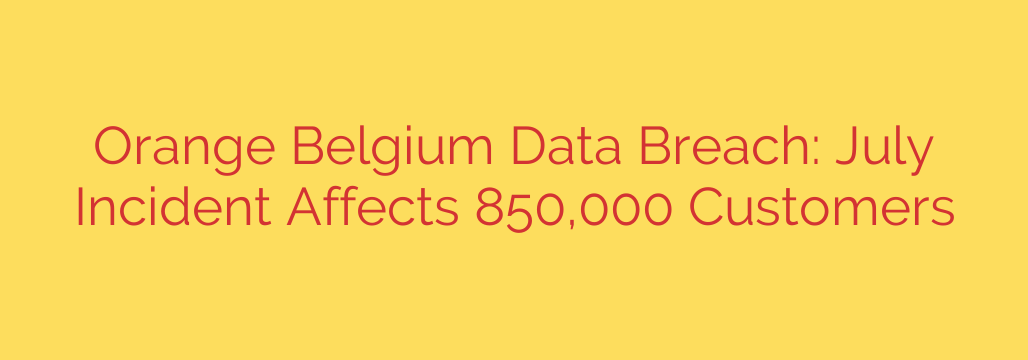
Orange Belgium Data Breach Exposes Data of 850,000 Customers: What You Need to Know
A significant cybersecurity incident at Orange Belgium has resulted in the exposure of personal data belonging to approximately 850,000 customers. The breach, which occurred in July 2024, stemmed from a compromised server operated by a third-party service provider.
This incident highlights the ongoing risks associated with supply chain vulnerabilities and underscores the importance of digital vigilance for all consumers. If you are an Orange Belgium customer, here is a detailed breakdown of the breach and the steps you should take to protect yourself.
What Customer Information Was Compromised?
The breach exposed a specific set of personally identifiable information (PII) that could be used by malicious actors to orchestrate sophisticated scams. The compromised data includes:
- Full names
- Physical addresses
- Email addresses
- Phone numbers
- Bank account numbers (IBANs)
- Customer numbers
Crucially, the combination of contact details with financial information like IBANs creates a significant risk for targeted phishing and fraud attempts.
Information That Remains Secure
Orange Belgium has confirmed that more sensitive data was not affected by this breach. The following information remains secure:
- Passwords
- Payment data (credit card information)
- Call history and usage data
While the absence of compromised passwords provides some relief, the exposed data is more than enough for cybercriminals to craft highly convincing and personalized attacks.
The Primary Risk: A Surge in Phishing and Scams
The greatest danger to affected customers is not direct financial theft from their bank accounts but rather the increased likelihood of becoming a victim of phishing, smishing (SMS phishing), or vishing (voice phishing).
Cybercriminals can leverage the stolen information—your name, address, phone number, and even your bank account number—to create legitimate-sounding communications. They might impersonate Orange, your bank, or another trusted organization to trick you into revealing more sensitive information, such as passwords, online banking credentials, or credit card details.
Be on the lookout for messages that:
- Claim there is a problem with your account or a payment.
- Ask you to click a link to verify your identity.
- Offer an urgent refund or a special discount.
- Contain spelling or grammatical errors.
How to Protect Yourself Following the Breach
Vigilance is your best defense. All Orange Belgium customers, especially those confirmed to be affected, should immediately adopt the following security measures.
1. Be Skeptical of All Communications
Treat every incoming email, text message, and phone call with caution, especially if it claims to be from Orange or your bank. Scammers will use the stolen data to make their communications sound official and personal.
2. Never Click on Unsolicited Links or Attachments
Do not click on links or download attachments from suspicious emails or text messages. If you need to access your Orange Belgium account, manually type the official website address into your browser instead of using a provided link.
3. Verify Requests Independently
If you receive a call or message asking for personal information, hang up or delete the message. Contact the company directly using a phone number or email address from their official website to verify the legitimacy of the request. Remember, Orange and your bank will never ask for your password via email or SMS.
4. Monitor Your Bank Accounts
Since IBANs were exposed, keep a close watch on your bank statements for any unauthorized or unusual activity. Report any suspicious transactions to your financial institution immediately.
5. Enable Two-Factor Authentication (2FA)
While passwords were not compromised in this specific breach, it is an essential security layer for all your online accounts. Enable 2FA wherever possible, especially for your email and banking applications. This provides an extra barrier against unauthorized access.
6. Inform Your Friends and Family
Awareness is key. Share this information with friends and family who may also be Orange customers, ensuring they are aware of the risks and know how to protect themselves from potential scams.
Source: https://securityaffairs.com/181399/uncategorized/orange-belgium-july-data-breach-impacted-850000-customers.html








